Henry Bell - Life of Mary Queen of Scots, Volume 1 (of 2)
Здесь есть возможность читать онлайн «Henry Bell - Life of Mary Queen of Scots, Volume 1 (of 2)» — ознакомительный отрывок электронной книги совершенно бесплатно, а после прочтения отрывка купить полную версию. В некоторых случаях можно слушать аудио, скачать через торрент в формате fb2 и присутствует краткое содержание. Жанр: foreign_antique, foreign_prose, на английском языке. Описание произведения, (предисловие) а так же отзывы посетителей доступны на портале библиотеки ЛибКат.
- Название:Life of Mary Queen of Scots, Volume 1 (of 2)
- Автор:
- Жанр:
- Год:неизвестен
- ISBN:нет данных
- Рейтинг книги:5 / 5. Голосов: 1
-
Избранное:Добавить в избранное
- Отзывы:
-
Ваша оценка:
- 100
- 1
- 2
- 3
- 4
- 5
Life of Mary Queen of Scots, Volume 1 (of 2): краткое содержание, описание и аннотация
Предлагаем к чтению аннотацию, описание, краткое содержание или предисловие (зависит от того, что написал сам автор книги «Life of Mary Queen of Scots, Volume 1 (of 2)»). Если вы не нашли необходимую информацию о книге — напишите в комментариях, мы постараемся отыскать её.
Life of Mary Queen of Scots, Volume 1 (of 2) — читать онлайн ознакомительный отрывок
Ниже представлен текст книги, разбитый по страницам. Система сохранения места последней прочитанной страницы, позволяет с удобством читать онлайн бесплатно книгу «Life of Mary Queen of Scots, Volume 1 (of 2)», без необходимости каждый раз заново искать на чём Вы остановились. Поставьте закладку, и сможете в любой момент перейти на страницу, на которой закончили чтение.
Интервал:
Закладка:
James Hamilton, Earl of Arran, and next heir to the throne, was the third candidate, and the person upon whom the choice of the people ultimately fell. In more settled times, this choice might possibly have been judicious; but Arran was of far too weak and irresolute a character to be able to regulate the government with that decision and firmness which the existing emergency required. He had few opinions of his own, and was continually driven hither and thither by the contradictory counsels of those who surrounded him. He had joined, however, the reformed religion; and this, together with the inoffensive softness of his disposition, made him, in the eyes of many, only the more fit to govern.
The annexation of Scotland to the crown of England, either by conquest or the more amicable means of marriage, had for many years been the object nearest the heart of Henry VIII. and several of his predecessors. That his father, in particular, Henry VII., had given some thought to this subject, is evident from the answer he made to such of his Privy Council as were unwilling that he should give his daughter Margaret in marriage to James IV., on the ground that the English Crown might, through that marriage, devolve to a King of Scotland. “Whereunto the King made answer, and said, ‘What then? for if any such thing should happen (which God forbid), yet I see our kingdom should take no harm thereby, because England should not be added unto Scotland, but Scotland unto England, as to the far most noble head of the whole island; for so much as it is always so, that the lesser is wont, for honour’s sake, to be adjoined to that which is far the greater.’” 1 1 Polydore, lib. 26. quoted by Leslie – “Defence of Mary’s Honour,” Preface, p. xiv. – Apud Anderson, vol. I.
How correct Henry VII. was in his opinion, the accession of James VI. sufficiently proved.
Henry VIII., though aiming at the same object as his father, thought it more natural that Scotland should accept of an English, than England of a Scottish King. Immediately, therefore, after the birth of Mary, he determined upon straining every nerve to secure her for his son Edward. For this purpose, he concluded a temporary peace with the Regent Arran, and sent back into Scotland the numerous prisoners who had surrendered themselves at Solway Moss, upon an understanding that they should do all they could to second his views with their countrymen. His first proposals, however, were so extravagant, that the Scottish Parliament would not listen to them for a moment. He demanded not only that the young Queen should be sent into England, to be educated under his own superintendance, but that he himself, as her future father-in-law, should be allowed an active share in the government of Scotland. Having subsequently consented to depart considerably from the haughty tone in which these terms were dictated, a treaty of marriage was agreed upon at the instigation of Arran, whom Henry had won to his interests, in which it was promised, that Mary should be sent into England at the age of ten, and that six persons of rank should, in the mean time, be delivered as hostages for the fulfilment of this promise.
It may easily be conceived, that whatever the Regent, together with some of the reformed nobility and their partisans, might think of this treaty, the Queen Mother and Cardinal Beaton, who had for the present formed a coalition, could not be very well satisfied with it. Henry, with all the hasty violence of his nature, had, in a fit of spleen, espoused the reformed opinions; and if Mary became the wife of his son, it was evident that all the interests both of the House of Guise and of the Catholic religion in Scotland, would suffer a fatal blow. By their forcible representations of the inevitable ruin which they alleged this alliance would bring upon Scotland, converting it into a mere province of their ancient and inveterate enemies, and obliging it to renounce forever the friendship of their constant allies the French, they succeeded in effecting a change in public opinion; and the result was, that Arran found himself at length obliged to yield to their superior influence, to deliver up to the Cardinal and Mary of Lorraine the young Queen, and refuse to ratify the engagements he had entered into with Henry. The Cardinal now carried every thing before him, having converted or intimidated almost all his enemies. The Earl of Lennox alone, a nobleman whose pretensions were greater than his power, could not forgive Beaton for having used him merely as a cat’s paw in his intrigues to gain the ascendency over Arran. Lennox had himself aspired at the Regency, alleging that his title, as presumptive heir to the Crown, was a more legitimate one than that of the House of Hamilton, to which Arran belonged. But the still more ambitious Cardinal flattered only to deceive him; and when Lennox considered his success certain, he found himself farther from the object of his wishes than ever.
Seeing every other hope vain, Lennox set on foot a secret correspondence with Henry, promising that monarch his best support, should he determine upon avenging the insult he had sustained, through the vacillating conduct of the Scotch. Henry gladly availed himself of the offer, and sent a considerable force under the Earl of Hartford to the North, by sea, which, having landed at Leith, and plundered that place, as well as the neighbouring city of Edinburgh, again took its departure for England, without attempting to penetrate further into the country. This was an unprofitable and ill-advised expedition, for it only tended to exasperate the minds of the Scotch, without being of any service to Henry. The Earl of Huntly well remarked concerning it, that even although he might have had no objections to the proposed match, he had a most especial dislike to the manner of wooing.
The Earl of Lennox now found himself deserted in the midst of his former friends, and went prudently into voluntary exile, by retiring into England. Here Henry, in reward of his former services, gave him his niece, the Lady Margaret Douglas, in marriage. She was the daughter, by the second marriage, of Henry’s sister, the Lady Margaret, wife of James IV., who, after the King’s death, espoused Archibald Earl of Angus. By this alliance, Lennox, though it was impossible for him to foresee such a result, became the father of Henry Darnley, and a long line of Kings.
Shortly afterwards, an event well known in Scottish history, and which was accomplished by means only too frequently resorted to in those unsettled times, facilitated the conclusion of a short peace with England. Cardinal Beaton, elevated by his success, and anxious, now that all more immediate danger was removed, to re-establish on a firmer basis the tottering authority of the Romish Church, determined upon striking awe into the people, by some memorable examples of severity towards heretics. About the end of the year 1545, he made a progress through several parts of his diocess, accompanied by the Earl of Argyle, who was then Lord Justice General, and other official persons, for the purpose of trying and punishing offenders against the laws of the Church. At Perth, several of the lieges were found guilty of arguing or disputing concerning the sense of the Holy Scriptures, in opposition to an Act of Parliament, which forbade any such freedom of speech, and five men and one woman were condemned to die. Great intercession was made for them, but in vain; the men were hanged, and the woman was drowned. Still farther to intimidate the Reformers, a yet more memorable instance of religious persecution and cruelty was presented to them a few months afterwards. George Wishart was at this time one of the most learned and zealous of all the supporters of the new doctrines in Scotland. He had been educated at the University of Cambridge, and had, in his youth, officiated as one of the masters of the grammar school at Montrose. His talents and perseverance rendered him particularly obnoxious to the Cardinal, who, having contrived to make him his prisoner, carried him to his castle at St Andrews. An Ecclesiastical Court was there assembled, at which Wishart was sentenced to be burnt. It may give us a clearer idea of the spirit of the times, to know, that on the day on which this sentence was to be put in execution, Beaton issued a proclamation, forbidding any one, under pain of church censure, to offer up prayers for so notorious a heretic. When Wishart was brought to the stake, and after the fire had been kindled, and was already beginning to take effect, it is said that he turned his eyes towards a window in the castle overlaid with tapestry, at which the Cardinal was sitting, viewing with complacency the unfortunate man’s suffering, and exclaimed, – “He who, from yonder high place, beholdeth me with such pride, shall, within few days, be in as much shame as now he is seen proudly to rest himself.” These words, though they met with little attention at the time, were spoken of afterwards as an evident and most remarkable prophecy.
Читать дальшеИнтервал:
Закладка:
Похожие книги на «Life of Mary Queen of Scots, Volume 1 (of 2)»
Представляем Вашему вниманию похожие книги на «Life of Mary Queen of Scots, Volume 1 (of 2)» списком для выбора. Мы отобрали схожую по названию и смыслу литературу в надежде предоставить читателям больше вариантов отыскать новые, интересные, ещё непрочитанные произведения.
Обсуждение, отзывы о книге «Life of Mary Queen of Scots, Volume 1 (of 2)» и просто собственные мнения читателей. Оставьте ваши комментарии, напишите, что Вы думаете о произведении, его смысле или главных героях. Укажите что конкретно понравилось, а что нет, и почему Вы так считаете.












